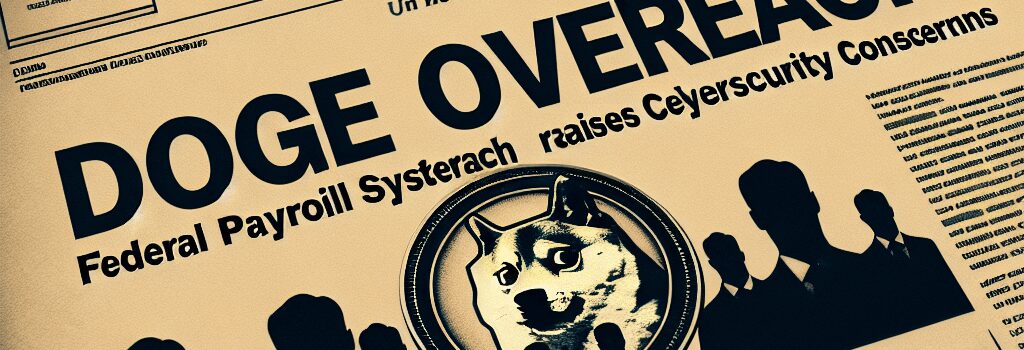DOGE Overreach: Federal Payroll System Breach Raises Cybersecurity Concerns

The Department of Government Efficiency (DOGE), led by Elon Musk, has recently expanded its access within the federal payroll system, a move that has raised alarm bells among IT officials and cybersecurity experts. This system, which processes salaries for approximately 276,000 federal employees across multiple agencies, now falls under new centralized control despite longstanding objections from experienced IT staff.
Summary of Recent Developments
According to a report from The New York Times, DOGE managed to secure access to a critical Interior Department payroll system over a short two-week period. This system grants its users visibility into highly sensitive employee data, including Social Security numbers, and provides the authority to modify employment details such as hiring, firing, compensation, and benefits.
- Access Granted: DOGE workers, including Stephanie Holmes and Katrine Trampe, now have the authority to make changes to employment status and compensation without additional oversight.
- Employee Pushback: Senior IT officials who expressed concerns about exposing sensitive government personnel information were placed on administrative leave and are currently under investigation for their workplace behavior.
- Legal and Administrative Ramifications: DOGE’s expanded authority follows a recent federal appeals court decision that reversed an earlier ruling demanding transparency in the agency’s cost-cutting operations.
Technical Details and Security Implications
The technical modifications to the payroll system’s access control protocols have raised significant concerns within the IT community. Traditionally, sensitive systems like the Federal Personnel and Payroll System require rigorous operator training and mandatory certifications to minimize the risk of human error. A memo from senior career employees warned that without formal qualifications, the new level of access could lead to severe operational failures. Experts emphasize that combining elevated privileges with weak operator oversight creates an attractive target for cyber adversaries, including state-sponsored hackers and terrorist organizations.
In addition, the overhaul brings potential risks such as:
- Improper handling of sensitive data due to insufficiently trained personnel.
- Greater vulnerability to cyberattacks driven by the centralized control of payroll and personnel information.
- A significant increase in the attack surface as the system integrates more closely with disparate federal databases.
Cybersecurity professionals are also debating the decision to bypass established protocols for system access and data modification. The lack of multifactor authentication in some of these processes and the removal of additional layers of oversight are seen as critical weaknesses that could be exploited by malicious actors.
Operational Efficiency vs. Security Protocols
Elon Musk defended the initiative before Fox News last week, stating that DOGE is tasked with reconciling disparate government databases to eliminate waste and fraud. He admitted that the process of integrating these isolated systems is challenging but inevitable for improving overall government efficiency. However, critics argue that consolidating such high-value assets under a single administrative umbrella may undermine long-established checks and balances, thereby exposing the government to broader cybersecurity threats.
Another layer of complexity is added by the recent legal debates. A federal appeals court recently ruled that neither Musk nor DOGE is obligated to divulge internal documents related to their cost-cutting measures, following a suit by 14 states. This decision underscores the tension between executive power and transparency requirements, particularly in an era where cybersecurity risks are paramount.
Expert Analysis and Future Outlook
Renowned cybersecurity expert Dr. Elaine Redding commented on the situation: ‘While streamlining operations and reducing bureaucratic redundancy is important, it must not come at the cost of security. Elevated access to sensitive systems should always be accompanied by robust training and multi-layered defense strategies.’
Looking ahead, many officials and external experts are calling for enhanced oversight mechanisms. Some suggestions include:
- Implementing mandatory certification programs for all personnel with access to critical systems.
- Deploying advanced identity and access management (IAM) frameworks to ensure that elevated privileges are appropriately monitored and audited.
- Establishing an independent review board to oversee inter-agency data integrations and flag potential cybersecurity risks.
The ongoing debate between achieving governmental efficiency and maintaining rock-solid cybersecurity is set to redefine how digital systems within federal agencies are managed. As new developments emerge, continuous dialogue between IT professionals, cybersecurity experts, and policymakers will be critical in shaping a more secure operational landscape for government IT infrastructures.
Final Thoughts
The recent expansion of DOGE’s access marks a significant turning point in federal IT management. While the aim to cut costs and streamline operations is understandable, the potential risks associated with such broad access to sensitive data could have far-reaching implications. The future of federal digital infrastructure will likely depend on how effectively the balance between operational efficiency and cybersecurity can be maintained in an increasingly integrated government.